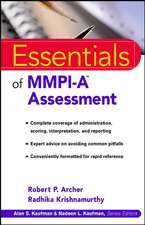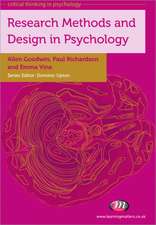Methods for Behavioral Research: A Systematic Approach
Autor Paul David Cherulniken Limba Engleză Hardback – 20 aug 2001
Preț: 1209.56 lei
Preț vechi: 1656.93 lei
-27% Nou
Puncte Express: 1814
Preț estimativ în valută:
231.52€ • 251.57$ • 194.60£
231.52€ • 251.57$ • 194.60£
Carte tipărită la comandă
Livrare economică 21 aprilie-05 mai
Preluare comenzi: 021 569.72.76
Specificații
ISBN-13: 9780761921998
ISBN-10: 0761921990
Pagini: 576
Dimensiuni: 187 x 247 x 30 mm
Greutate: 1.02 kg
Ediția:1
Editura: SAGE Publications
Colecția Sage Publications, Inc
Locul publicării:Thousand Oaks, United States
ISBN-10: 0761921990
Pagini: 576
Dimensiuni: 187 x 247 x 30 mm
Greutate: 1.02 kg
Ediția:1
Editura: SAGE Publications
Colecția Sage Publications, Inc
Locul publicării:Thousand Oaks, United States
Recenzii
"The book idea is a very good one in my opinion, and much needed in the research methods area . . . very well organizaed, well-thought out, and well written. . . . The organization is easy to follow, the material presented in an interesting way, and the use of examples is excellent."
"The author’s conceptual approach is very complementary to the manner in which I have constructed my advanced course. Namely, I emphasize the development of critical thinking skills in the design and critique of experiments….Overall, I think this is an excellent approach to research design. The author does an outstanding job of integrating real-world examples into the text. This is an extremely valuable feature. I would seek to adopt this text for one, or depending on the final version, both of my courses."
"This manuscript is ideal for my course…First, the author’s writing style makes it quite clear that his primary objective is to help students understand this material. I have commented repeatedly on the honesty and directness of this text—I am certain my students would be as enthusiastic as I am. Second, the author takes a very practical approach to the material by pointing out theoretical issues and then discussing the practicalities of research design. This, too, would catch my students’ attention. Third, the examples used to explain concepts are numerous and relevant to real life. Not only has the author included psychological examples, but also some drawn from politics, biology, and physics. Other points of interest to me are the 25 examples of psychological research presented in chapter 2 and woven through the rest of the text. This is a wonderful way to give students a set of common experiences for me to draw on in class. Furthermore, the "boxes" fit in very well with my emphasis on critical thinking. The author leads the student to the brink of an answer to an important question, and then steps back to let the student experience the insight. Very well done."
"I found the manuscript very well written. I liked the use of novel and interesting examples from the psychological literature – too often, research methods textbooks recycle all the old Campbell and Stanley examples verbatim….Overall, a fine piece of textbook writing."
"I believe that the author has met his goal of writing a text that provides ‘both’ a theoretical understanding of research issues and a nuts-and-bolts guide to conducting research in psychology….This text presents virtually all of the critical issues in psychological research in a clear and easy-to-read manner. Issues are presented within the critical context of validity and reliability, which is exactly how I tend to orient my own research methods course. If students finish an introductory research methods course with a decent understanding of validity and how it relates to the components of an experiment, then there is nothing in advanced research courses that they can’t handle."
"I liked the plan and organization…the book would be a useful addition to the field….I like the use of a core set of studies to illustrate principles of design and analysis through the text; that should work very well….The approach is distinctive."
"The author’s conceptual approach is very complementary to the manner in which I have constructed my advanced course. Namely, I emphasize the development of critical thinking skills in the design and critique of experiments….Overall, I think this is an excellent approach to research design. The author does an outstanding job of integrating real-world examples into the text. This is an extremely valuable feature. I would seek to adopt this text for one, or depending on the final version, both of my courses."
"This manuscript is ideal for my course…First, the author’s writing style makes it quite clear that his primary objective is to help students understand this material. I have commented repeatedly on the honesty and directness of this text—I am certain my students would be as enthusiastic as I am. Second, the author takes a very practical approach to the material by pointing out theoretical issues and then discussing the practicalities of research design. This, too, would catch my students’ attention. Third, the examples used to explain concepts are numerous and relevant to real life. Not only has the author included psychological examples, but also some drawn from politics, biology, and physics. Other points of interest to me are the 25 examples of psychological research presented in chapter 2 and woven through the rest of the text. This is a wonderful way to give students a set of common experiences for me to draw on in class. Furthermore, the "boxes" fit in very well with my emphasis on critical thinking. The author leads the student to the brink of an answer to an important question, and then steps back to let the student experience the insight. Very well done."
"I found the manuscript very well written. I liked the use of novel and interesting examples from the psychological literature – too often, research methods textbooks recycle all the old Campbell and Stanley examples verbatim….Overall, a fine piece of textbook writing."
"I believe that the author has met his goal of writing a text that provides ‘both’ a theoretical understanding of research issues and a nuts-and-bolts guide to conducting research in psychology….This text presents virtually all of the critical issues in psychological research in a clear and easy-to-read manner. Issues are presented within the critical context of validity and reliability, which is exactly how I tend to orient my own research methods course. If students finish an introductory research methods course with a decent understanding of validity and how it relates to the components of an experiment, then there is nothing in advanced research courses that they can’t handle."
"I liked the plan and organization…the book would be a useful addition to the field….I like the use of a core set of studies to illustrate principles of design and analysis through the text; that should work very well….The approach is distinctive."
Cuprins
An Overview of the Research Process
Formulating the Research Hypothesis
Specifying the Research Variables I
Operational Definition and Measurement
Specifying the Research Variables II
Artifacts and Construct Validity
Arranging the Comparisons I
An Introduction to Research Design
Arranging the Comparisons II
Designs for Psychological Research
Arranging the Comparisons III
Evaluating Research Designs
Building Models of Multiple Causes and Effects
Collecting the Data
Analyzing the Data
The Researcher's Responsibilities as Scientist, Colleague and Citizen
Formulating the Research Hypothesis
Specifying the Research Variables I
Operational Definition and Measurement
Specifying the Research Variables II
Artifacts and Construct Validity
Arranging the Comparisons I
An Introduction to Research Design
Arranging the Comparisons II
Designs for Psychological Research
Arranging the Comparisons III
Evaluating Research Designs
Building Models of Multiple Causes and Effects
Collecting the Data
Analyzing the Data
The Researcher's Responsibilities as Scientist, Colleague and Citizen
Notă biografică
Descriere
This core textbook introduces psychology students to research methods. The author's principal goal is to present methods in a way that will lend coherence to the material. He does this by providing a meaningful framework based around Campbell and Stanley's "threats to validity" and by organizing the book around the phases of the research process. In addition, in his approach and via boxed features, the author encourages and models a process of critical thinking for students.
















